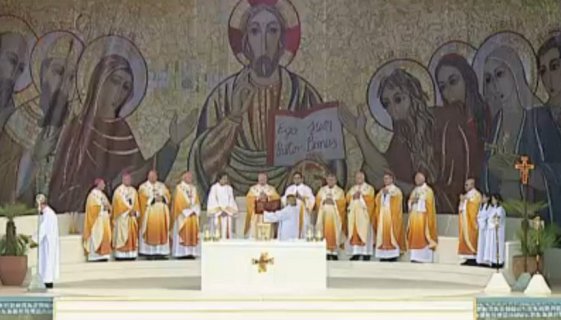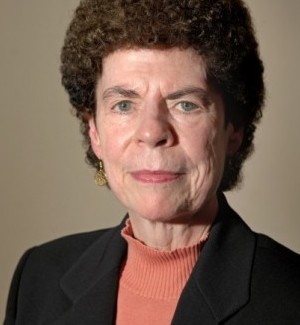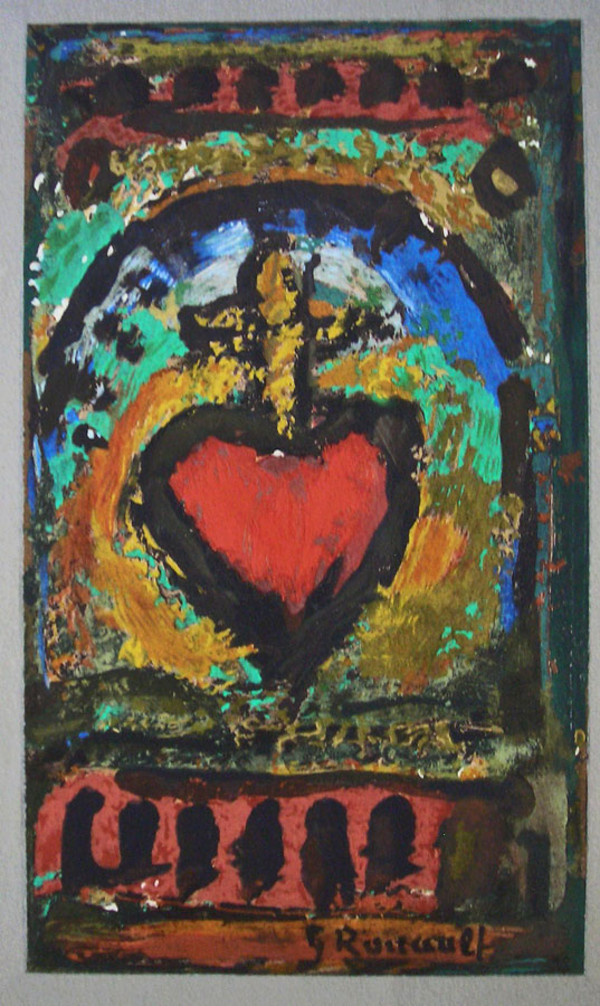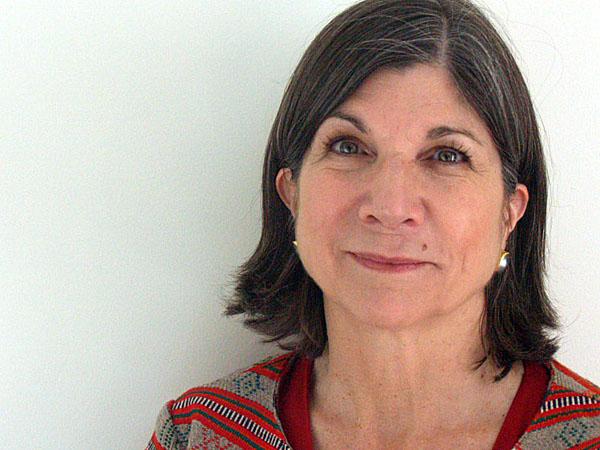We passed a major one this morning. Arvo Part's setting of Psalm 129 will serve today as our dirge for liberty.
Thoughts on topics of interest mainly to Catholics, including sacraments, the Virgin Mary, saints, angels, popes, feast days, liturgy, liturgical music, prayer, Church Fathers, Doctors of the Church, rosaries, religious congregations, novenas, Catholic education, and the Sacred Heart.
Thursday, June 28, 2012
Another milestone on the road to serfdom
We passed a major one this morning. Arvo Part's setting of Psalm 129 will serve today as our dirge for liberty.
Labels:
Arvo Part
Wednesday, June 27, 2012
Fr. Croiset and Reverence for the Blessed Sacrament
The Sacred Heart of Jesus
The following is taken from a meditation by Fr. John Croiset, SJ (d. 1738 AD) for the Feast of the Sacred Heart:
"What answer could Catholics give to heretics if these latter reproach them with the want of reverence of many Catholics in church. . . If they say, you, Catholics, believe that Jesus Christ is really present on the altar in this Host, . . . if you believe in the Divine Presence in your churches, how comes it that you do not show more respect there? We have contempt for your Sacraments, a heretic might say, but do you yourselves not teach us to despise them?"
Though we may take some comfort from the knowledge that a lack of reverence for the Eucharist among Catholics is not new, I believe Fr. Croiset would be shocked by the lack of reverence seen among Catholics today.
Friday, June 22, 2012
Western Culture RIP
"Don Giovanni Dragged Down to Hell," Pietro Bini
Not only can we ourselves no longer produce new art, we can't even understand the old art our culture has already produced. For example, in a new English production of Mozart's Don Giovanni, the title character, who is meant to be an unrepentant dissolute, is instead depicted as a hapless chap who finds himself seduced by a raunchy Donna Anna. At the opera's normally dramatic conclusion, instead of being dragged down to Hell by demons, the Don simply collapses into a wheelchair, and may or may not be dead. In other words, Mozart's masterpiece, like so many others, has been reduced to meaningless travesty. The estimable Dr. Oddie has more here.
Labels:
Don Giovanni,
Dr. William Oddie,
Mozart
Thursday, June 21, 2012
Hail, Aloysius, Saintly Religious and Patron of Youth
"The Vocation of St. Aloysius Gonzaga," G. F. Barbieri
Today we celebrate the feast of St. Aloysius Gonzaga (1568 AD - 1591 AD), canonized in 1726, and named Patron of Youth by Pope Pius XI in 1926. St. Aloysius was born into an aristocratic Italian family, and was expected to enter his father's profession of soldier. Accordingly, at a very young age he began his military training by serving at the court of the Grand Duke Francesco d'Medici in Florence, which was followed two years later by service at the court of the Duke of Mantua. St. Aloysius, however, was by nature very serious and religious, having by the age of nine made a vow of perpetual chastity, and was shocked by the violence and immorality of the Duke's court. Around this time, St. Aloysius met St. Robert Bellarmine, the Jesuit Cardinal and Doctor of the Church, and received his first communion from him. It was at this time also that St. Aloysius formed the intention of entering religious life and becoming a missionary. Over the strenous objections of his father, St. Aloysius renounced his birthright in favor of his younger brother and entered the Society of Jesus in 1585. While he was studying theology in Rome, plague broke out in the city. The Jesuits opened an infirmary for plague victims, and St. Aloysius volunteered to serve in it. Although his superiors attempted to shield him from the disease, in March, 1591 St. Aloysius nevertheless contracted the plague. It was expected he would shortly die, and indeed extreme unction was administered to him, but St. Aloysius's condition, to everyone's great joy and surprise, improved. However, St. Aloysius at this time had a vision, according to which, as he informed his confessor, St. Robert Bellarmine, he would die on the Octave of the Feast of the Sacred Heart, a day which that year fell on June 21. On that day, though he seemed well in the morning, St. Aloysius would indeed die, just before midnight. Thirty years later, as St. Robert Bellarmine himself was near death, he expressed, to those gathered around his deathbed, his wish to be buried "at the feet of Aloysius Gonzaga." St. Robert Bellarmine's wish was granted, and he and St. Aloysius are buried together in the Church of St. Ignatius in Rome.
St. Aloysius Gonzaga, patron of youth, pray for us.
Wednesday, June 20, 2012
Fr. John Croiset, SJ and Devotion to the Sacred Heart
Sacred Heart of Jesus
Fr. John Croiset, SJ was spiritual director to St. Margaret Mary Alacoque, the great apostle and visionary of devotion to the Sacred Heart. St. Margaret Mary told Fr. Croiset that it was Jesus's ardent wish that he assist her in making devotion to the Sacred Heart, until then a private devotion of chosen souls, generally known to all of the faithful. After St. Margaret Mary's death, Fr. Croiset duly compiled an account of her revelations concerning the Sacred Heart, together with her prayers concerning this devotion, into a volume entitled The Devotion to the Sacred Heart which was published in 1691 AD. In 1704, due to Fr. Croiset's failure to observe certain formalities, the book was placed on the Index of Forbidden Books, where it remained for two centuries. During this time Fr. Croiset's book was nearly forgotten. However, a certain bishop, wishing to call attention to devotion to the Sacred Heart within his diocese, came upon the text, and finding that it had been placed upon the Index, called for the Sacred Congregation of the Index to re-examine the book. The Sacred Congregation determined that no error could be found in the work, and so it was at last removed from the Index. The following is taken from a meditation for the Feast of the Sacred Heart found it Fr. Croiset's "The Devotion to the Sacred Heart:"
The ardent desire of Jesus Christ to unite Himself to us.
Consider that union of hearts is the ultimate effect towards which love tends. This union of hearts was the object which Jesus Christ had in mind when he instituted the Eucharist. In this adorable Mystery, He acts like one passionately inflamed with love for men, since in It love makes Him in a manner go out of Himself in order to live only in the object of His love. "At this holy Table," said St. Augustine, "Christ has consecrated the Mystery of union with us. . . ."
"I will love Thee, O most Sacred Heart of Jesus that was wounded for me, wounded on the Cross for my sins, wounded in the Blessed Sacrament with love for me. I will honor Thee for the rest of my life, I will consecrate Thee the days that remain; Thou shalt be my place of repose, my dwelling place and my place of refuge. "This is my place of rest, here will I dwell."
Tuesday, June 19, 2012
Love of the Most Sacred Heart of Jesus
"St. Margaret Mary Contemplating the Sacred Heart of Jesus," Giaquinto
The Church traditionally devotes the month of June to the Most Sacred Heart of Jesus. The following is taken from "A Prayer of Love to the Sacred Heart" composed by the great visionary and apostle of devotion to the Sacred Heart, St. Margaret Mary Alacoque (1647 AD - 1690 AD):
"O Heart of Jesus all inflamed with love and living by love, O Sanctuary of the Divinity, Temple of His Sovereign Majesty, Altar of Divine Charity, O Heart burning with love for God and for me, I adore Thee, I love Thee, I melt with love and reverence before Thee! I unite myself with Thy holy dispositions, I desire most earnestly to burn with Thy fire and to live by Thy life. . . .
O Divine heart, I unite myself with Thee, and lose myself in Thee. I do not wish to live any longer but in Thee, by Thee and for Thee."
Friday, June 15, 2012
Feast of the Most Sacred Heart of Jesus
Today is the Feast of the Most Sacred Heart of Jesus. The Sacred Heart is depicted as flaming,
pierced and encircled with thorns, showing the great intensity of Christ's love for humanity, as well as the manner of death he willingly suffered to
save us from sin and death.
One of the leading figures in the history of devotion to the
Sacred Heart of Jesus is St. Mechtilde (d. 1298 AD), a great German mystic and
nun. St. Mechtilde was granted a number
of revelations, including some concerning the Sacred Heart, which were gathered
into a book called "The Book of Special Grace." This book, which was made public after St.
Mechtilde's death, had a profound influence upon, among others, the great
Italian poet Dante. The figure of
Matelda, who appears repeatedly in the Purgatorio and is described as "a
lady, solitary, beautiful, and gracious" is believed to be based on St.
Mechtilde.
The following is taken from St. Mechtilde's revelations:
"One day I saw the Son of God, holding in His Hand His
own Heart, which appeared more brilliant than the sun and which was casting
rays of light on every side; then, this amiable Saviour gave me to understand
that all the graces which God unceasingly pours forth on men, according to the
capacity of each, come from the plenitude of the Divine Heart."
Labels:
Most Sacred Heart of Jesus,
St. Mechtilde
Thursday, June 14, 2012
Hope for the Church in Ireland
Opening Mass of 2012 Eucharistic Congress
Though the Church's condition there remains dire, and Ireland itself is now described by some as "a spiritual desert," at Eucharistic Congress in Dublin new stirrings of faith are seen. Mary O'Regan has more here.
Labels:
2012 Eucharistic Congress
Tuesday, June 12, 2012
This is why we have bishops
Sr. Margaret Farley
Catholic grammar school alumni will be familiar with this expression
Catholic grammar school alumni will be familiar with this expression
To tell "theologians" like Sister Margaret Farley that her views on sexuality lie outside the bounds of Catholic teaching. Fr. Alexander Lucie-Smith has more here.
June is the month of the Sacred Heart
"Sacred Heart," Georges Rouault
For centuries, the Church has devoted the month of June to the Sacred Heart. St. Margaret Mary Alacoque, the visionary and great apostle of devotion to the Sacred Heart of Jesus (see Catholic Encyclopedia article here), composed many prayers to the Sacred Heart. The following is taken from a prayer of St. Margaret Mary's called "Prayer to Our Lord in His Character of King in the Blessed Sacrament":
"Come, O my sovereign King, break my bonds, deliver me from this wretched slavery and establish Thy empire over my heart. I wish to reign in Thine by ardent charity towards my neighbor, speaking of him only with charity, bearing with him, excusing him, doing to him only what I would wish to be done unto me, never sullying my heart or my tongue by any slander or resentment; and I will not allow anything to trouble me in order that my King may find in me an empire of peace."
Sunday, June 10, 2012
The good news is, their foolishness is becoming obvious
In less than 25 years, the nun problem will have corrected itself
Perhaps to provide an update on the mental decay of Catholicism's trendy wing, the National Catholic Reporter published this essay by a person who "identifies as Catholic" but doesn't go to Mass (naturally), who believes the hierarchy is "a dying dragon," that nuns are nice, and that "the Eucharist will live only if we find a way for it to live outside the Mass." However, most of the commenters are sensible, which seems to indicate that many people read the National Catholic Reporter purely to be entertained by the silly notions on display there.
Labels:
National Catholic Reporter
Saturday, June 9, 2012
"The first black bishop"
Pope Leo X
The following is taken from Henri Daniel-Rops' "The Catholic Reformation," Vol II:
"In 1484 . .. a party of Franciscans landed in the Congo, and obtained some encouraging results. Five years later they converted a local chief. Then, shortly afterwards, the native king himself was touched by grace and received at baptism the name of John, for the King of Portugal was his godfather. Eight of his successors were Christians His son, called Alfonso, proved himself a sort of African Clovis, urging his people to conversion, asking for more priests (who were not always equal to their task) and protesting with Christian generosity against the shameful traffic in black slaves which was then developing with America. Alfonso conceived an idea far in advance of his time. Finding that many missionaries quickly succumbed to the climate, he thought of creating a native clergy. Accordingly, he sent one of his sons, Henry, to Lisbon, to be instructed and ordained priest. Now King Emanuel took a liking to the young man, who was indeed highly intelligent and extremely handsome; and as he happened to be sending an embassy to Leo X, to do solemn homage for his overseas empire, he entrusted its leadership to the young Negro, who was incidentally a good Latinist, and asked the Pope to grant him episcopal consecration. The humanist Leo was curious and amused; he let five years pass while Henry completed his studies, but at the end of that time (1518) he proceeded without hesitation to make him Bishop of Utica in partibus infidelium, the first black bishop, at the head of vast Congolese territories whether baptized or yet to be baptized. . . . . But alas, these first fruits were not destined to be followed by permanent harvests. . . . [T] he Congolese mission, though not completely abandoned, . . . vegetated, and did not really regain its vigour until the nineteenth century."
Thursday, June 7, 2012
"Something infinitely more disastrous"
Henri de Lubac, SJ
The following observations on the Church are taken from Fr. Henri de Lubac, SJ's "The Splendour of the Church:"
"The-Church-as-Mother is never at the end of her labour to deliver us to the life of the Spirit, and the greatest temptation to the Church which we constitute - the most subversive, the ever-recurrent, reappearing insidiously when all the rest are overcome, and even strengthened by those victories - is what Abbot Vonier called the temptation to "worldiness of the mind . . . the practical relinquishing of other-worldliness, so that moral and even spiritual standards should be based, not on the glory of the Lord, but on what is the profit of man; an entirely anthropocentric outlook would be exactly what we mean by worldliness. Even if men were filled with every spiritual perfection, but if such perfections were not referred to God (suppose this hypothesis to be possible) it would be unredeemed worldliness."
If this worldliness of the spirit were to invade the Church and set to work to corrupt her by attacking her very principle, it would be something infinitely more disastrous than any worldliness of the purely moral order."
Many in the Church have succumbed to the temptation Fr. de Lubac calls "wordliness of the mind." Among the Jesuits, Fr. de Lubac's own religious order, this "worldliness of the mind" has becoming especially dominant. As Fr. de Lubac predicted, the results have certainly been disastrous for both the Jesuits and the Church.
St. Ignatius Loyola, pray for us.
Labels:
Fr. Henri de Lubac,
SJ,
The Splendour of the Church
Tuesday, June 5, 2012
Catholic style over substance
Gregory Baum
Would you take style tips from this man?
The Second Vatican Council came to a close on December 8, 1965. Less than four years later, Gregory Baum, a Canadian priest and theologian who had served at the Council as a peritus, was near despair. Here is the reason, in Baum's own words:
". . . I could not understand why the Catholic Church, despite the good will of clergy and laity and the extraordinary institutional event of Vatican II, had been unable to move and adopt the new style of Catholicism outlined in the conciliar documents."
How great an ignorance of human nature is displayed in Baum's expectation that in a matter of a few years, hundreds of millions of people worldwide would not only read the very voluminous documents of the Council, but discern within their vague and wordy contours the "new style of Catholicism," and then immediately adopt this new style, putting aside the familiar religious practices of their entire lives to do it. No wonder Baum shortly left the priesthood. It's unclear whether he is still Catholic.
We will have more on Baum's views on the "new style of Catholicism" in coming posts.
Labels:
Gregory Baum,
Vatican Council II
Friday, June 1, 2012
Anna Quindlen was Catholic?
Anna Quindlen - seek her not among the pewsitters
Not only that, Quindlen claims to have sat in a pew on occasion, and hints that she has done this even during Mass. Yet, at a point in time which, despite its supposed significance, Quindlen can place only within several years, Quindlen determined that all this pewsitting she claims to have been doing was actually a ratification of things she had no wish to ratify. In other words, an observer who didn't know better might take her for an ordinary Catholic. Recoiling from this horrid possibility, Quindlen, to the extent she had been sitting in pews at all, stopped. Furthermore, Quindlen resolved to continue not sitting in pews forever, and recently declared this resolution to a not very astonished world.
Of course, I was aware that being of a mixed Irish and Italian background, Quindlen was familiar with and felt a certain attachment to Catholic things. However, whenever Quindlen raised a Catholic subject in her writings, it was invariably for the purpose of dissenting from or criticizing the Church's teaching on that subject. So naturally I assumed Quindlen was not a believer. In a newly published book, Quindlen has again taken up Catholic beliefs, once again with a view towards criticizing and dissenting from them, but there is a new finality to her attitude this time. Indeed, as Quindlen disclosed on NPR (where else?), she has "left the Church." The telling part, to me, is Quindlen's vagueness about when exactly this happened. Which is a bit like not remembering when exactly your house burned down. Or when exactly your child died. Deacon Greg has more here.
UPDATE:
THE CATHOLIC CHURCH CAN NO LONGER CONTAIN THAT PHENOMENON OF WISDOM AND GOODNESS WE CALL "ANNA QUINDLEN":
According to Hemingway, a good writer needs a "built-in, shock-proof, sh*t-detector." Anna Quindlen doesn't have one, or it's broken, or it doesn't work on her own sh*t. Get a load of this, (taken from Quindlen's NPR interview):
"I think not going [to Mass] anymore made me realize how much of the good had
been imprinted deep inside me, and how much of the rest I didn't need,"
she says. "I don't have to listen to the Gospel on Sunday to know the
stories of the New Testament. They inform so much of what I write that
they're practically like a news scrim that goes through my brain 24/7.
And I don't have to listen to a sermon to know what to think or feel
about them. It's almost as if I absorbed completely what mattered most
to me, and the rest could go."
"But Quindlen says she still relies on her faith.
"I
still walk around some mornings and look at the world and think, 'Oh my
God. This is so fantastic, and there's so many opportunities to do good
and to be happy,' " she says. "And I think that comes from some
deep-faith place that started in religion and now transcends it."
Did even so great a mystic as St. Teresa of Avila enjoy the grace of having the Gospels run through her brain 24/7? Nope, but Anna Quindlen does, though one gets the impression from her blase treatment of this spiritual marvel she regards it as no big deal. Did even so great a saint and intellect as St. Thomas Aquinas enjoy the grace of absorbing the New Testament in its completeness? No again, though Anna Quindlen received this privilege some time ago, along with the wisdom of determining what in the New Testament might safely be discarded. Did even so gentle and lowly a saint as St. Francis of Assisi ever claim to walk around thinking of nothing other than doing good and being happy? No, but Quindlen enjoys this experience regularly. Quindlen even has the presence of mind on these occasions (sounds like they might be triggered by entering Zabar's) to congratulate God for having made such a "fantastic" world as she strolls about blissfully.
I, for one, rejoice that Anna Quindlen has left the Church. Worshipping our present Deity keeps me occupied sufficiently, so I don't have time for worshipping an additional one. Perhaps the realization that in the Catholic Church the position of God is already filled motivated Quindlen's decision to "transcend" the Church. Doing so has certainly facilitated Quindlen's delusion that she outranks God.
Still, if Quindlen should ever detect within herself a curious longing to return to a pew (and over the centuries there has been considerable testimony that pretending to outrank God eventually produces a terrible ennui), there are several I would happily recommend.
Did even so great a mystic as St. Teresa of Avila enjoy the grace of having the Gospels run through her brain 24/7? Nope, but Anna Quindlen does, though one gets the impression from her blase treatment of this spiritual marvel she regards it as no big deal. Did even so great a saint and intellect as St. Thomas Aquinas enjoy the grace of absorbing the New Testament in its completeness? No again, though Anna Quindlen received this privilege some time ago, along with the wisdom of determining what in the New Testament might safely be discarded. Did even so gentle and lowly a saint as St. Francis of Assisi ever claim to walk around thinking of nothing other than doing good and being happy? No, but Quindlen enjoys this experience regularly. Quindlen even has the presence of mind on these occasions (sounds like they might be triggered by entering Zabar's) to congratulate God for having made such a "fantastic" world as she strolls about blissfully.
I, for one, rejoice that Anna Quindlen has left the Church. Worshipping our present Deity keeps me occupied sufficiently, so I don't have time for worshipping an additional one. Perhaps the realization that in the Catholic Church the position of God is already filled motivated Quindlen's decision to "transcend" the Church. Doing so has certainly facilitated Quindlen's delusion that she outranks God.
Still, if Quindlen should ever detect within herself a curious longing to return to a pew (and over the centuries there has been considerable testimony that pretending to outrank God eventually produces a terrible ennui), there are several I would happily recommend.
Labels:
Anna Quindlen
Subscribe to:
Comments (Atom)












